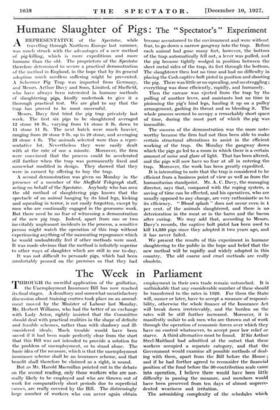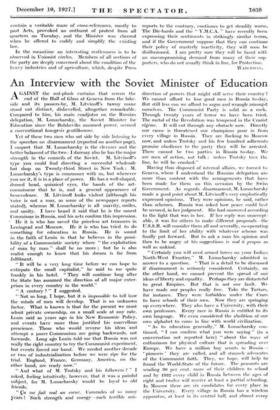The Week in Parliament THROUGH the merciful application of the
guillotine, the Unemployment Insurance Bill has now reached its final stages.. A desultory and somewhat unsatisfactory discussion about training centres took place on an amend- ment moved by the Minister of Labour last Monday. Mr. Herbert Williams, who had the better of an exchange with Lady Astor, rightly insisted that the Committee should deal with practical realities in the shape of definite and feasible schemes, rather than with shadowy and ill- considered ideals. Much trouble would have been saved if it had been made perfectly clear from the start that this Bill was not intended to provide a solution for the problem of unemployment, or to stand alone. The basic idea of the measure, which is that the unemployment insurance scheme shall be an insurance scheme, and that benefit shall therefore be claimed as a right, is sound.
But as Mr. Harold Macmillan pointed out in the debate on the second reading, only those workers who are nor- mally likely to be employed and who are thrown out of work for comparatively short periods due to superficial causes, are really covered by the Bill. The distressingly large number of Workers. who can never again obtain employment in their own trade remain untouched. It is unthinkable that any considerable number of these should be transferred to the rates in 1929. For them the State will, sooner or later, have to accept a measure of responsi- bility, otherwise the whole finance of the Insurance Act will break down irretrievably, and the burden on the rates will be still further increased. Moreover, it is manifestly unfair to ask men who are thrown out of work through the operation of economic forces over which they have no control whatsoever, to accept poor law relief or starve. A third alternative must be found. If Sir Arthur Steel-Maitland had admitted at the outset that these workers occupied a separate category, and that the Government would examine all possible methods of deal- ing with them, apart from the Bill before the House ; and if he had further agreed to reconsider the financial position of the fund before the 30-contribution_ scale caine into operation, I believe there would' have been little difficulty in passing the measure, and members would have been preserved from ten days of almost unprece. dented weariness and irritation.
The astonishing complexity of the schedules which contain. a veritable maze of cross-references, mostly to
/
past Acts, provoked an outburst of protest from all quarters on Tuesday, and the .r Minister was cheered Ns-ben he offered to codify and simplify the existing law.
In the meantime an interesting restlessness is to be observed in Unionist circles. Members of all section' s of the party are deeply concerned about the condition of the heavy industries and of agriculture, which, despite Press reports to the contrary, continues to get steadily worse. The Die-hards and the " Y.M.C.A. " have recently been expressing their sentiments in strikingly, similar terms, and if the Government suppose that they can continue their policy of masterly inactivity, they will soon be disillusioned. I am pretty sure they will be faced with an uncompromising demand from many of their sup7 porters, who do not usually think in line, for Protection.
WATCHMAN.











































 Previous page
Previous page